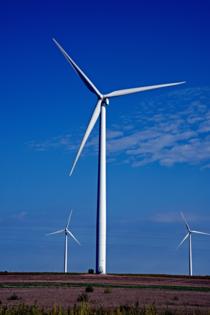Feds cancel $4.9 billion loan for Grain Belt Express energy project
Published in Business News
JEFFERSON CITY, Missouri — The U.S. Department of Energy has canceled a conditional $4.9 billion loan for the 800-mile Grain Belt Express transmission line that developers have sought to build for over a decade.
The Department of Energy said in a news release dated Wednesday that the conditions necessary to issue the loan guarantee were unlikely to be met and that "it is not critical for the federal government to have a role in supporting this project."
It added that the loan, issued by the Biden administration in November, was "one of many conditional commitments that were rushed out the door" in the administration's final days.
A spokesperson for the Grain Belt Express did not immediately respond to a request for comment Wednesday. Developers have been aiming to begin construction next year.
The project has long been a target of Missouri Republicans, with U.S. Sen. Josh Hawley calling for its cancellation this year. Missouri Attorney General Andrew Bailey has been investigating the project.
Bailey on Wednesday celebrated the decision to cancel the loan.
In a statement, he called the Grain Belt Express a "massive green energy scam," saying it was "propped up by the Biden Administration to benefit corporate interests at the expense of family farms."
And Hawley's office said the Missouri senator succeeded in securing the loan's cancellation.
Advocates have lauded the project as a key vehicle to bring cheap wind energy from the Plains to areas of high electricity demand, farther east.
The Sierra Club's Missouri chapter said Wednesday the Grain Belt Express would bolster grid reliability and resilience, creating construction jobs and lowering electricity costs for small towns.
Electric transmission has been touted in recent years as a front for sorely needed investment and expansion. The ability to get electricity from one point to another affects energy prices, reliability and greenhouse gas emissions.
Significant transmission bottlenecks have persisted in the United States for years.
“I think there’s a lot of clean energy that we’re not taking advantage of in this country because we don’t have a way to deliver it to customers,” James Owen, the executive director of Renew Missouri, a group that advocates for increased adoption of renewable power in the state, said in December.
The Grain Belt Express would stretch from wind-rich parts of western Kansas across Missouri and Illinois before reaching its eastern terminus in Indiana.
Although the Grain Belt faced years of hurdles and delays, it has secured approval in all four states it would traverse.
Invenergy, the transmission line’s Chicago-based developer, already has deals with municipal utilities seeking cheaper power through the project, guaranteed by contracts.
But Republicans in Missouri have long been critical of the project, raising eminent domain concerns.
Bailey in March wrote to Elon Musk and the Department of Government Efficiency, asking for an investigation into the $4.9 billion loan.
Bailey previously said the project is tied to nearly 50 eminent domain lawsuits against landowners along its route in Missouri.
“We’ve won a battle in the war for Missouri landowners," he said in a statement Wednesday.
Hawley, meanwhile, had sent two letters to U.S. Energy Secretary Chris Wright this year calling for the loan to be terminated.
"Your department should be taking every possible action to stop this loan — not only to save taxpayer’s money, but also to save generational land from being ripped away from families and hard-working farmers and ranchers in Missouri," Hawley said in a June 25 letter. "Now is the time to act."
Gretchen Waddell-Barwick, director of the Sierra Club's Missouri chapter, in a statement called it "sadly predictable that Sen. Hawley doesn’t care that this project played by the rules, received multiple state approvals, and withstood legal challenges."
©2025 STLtoday.com. Distributed by Tribune Content Agency, LLC.












Comments